This past Monday, at Central United Methodist Church on Adams Street in Detroit, Michigan, hundreds rallied, marched and shared a meal celebrating the legacy of Rev. Martin Luther King Jr.
The coalition was comprised of activists, community leaders, students, poets, parents and clergy. And while millions around the country were tuned into the televised inauguration of the first black president’s second term, those who had braved the gusty, snowy weather to gather in Detroit shared a different tone, rallying against the many injustices plaguing disposable communities nationwide, against the placid appropriation of Dr. King’s image and iconography by a society that still segregates on the basis of race and class – laid bare in cities like Detroit where the unmistakable burdens of second-class citizenship bear down on a majority black population.
Fifty years back, on June 23, 1963, at Cobo Center in Detroit, King had stood before 25,000 people delivering the first version of his famous “I Have a Dream” speech during a local march. King spoke broadly of the emancipation struggle for blacks which, then-100 years after Lincoln’s proclamation, held the same urgency as before; he also addressed racial segregation as a national shame that imperiled the future of democracy.
“The price that this nation must pay for the continued oppression and exploitation of the negro or any other minority group is the price of its own destruction,” he said. King asked the gathered audience to struggle for a “new day,” to “carve a tunnel of hope through the mountain of despair.”
Fifty years later, chocolate cities like Detroit, Inkster, Highland Park, Flint and Benton Harbor are cast under the long shadow of state emergency manager laws, stripped of all right to self-governance and community-controlled education. Entire communities are buried under mountains of inequality, and King, reflecting today would likely, it seems, speak more of nightmares than dreams.
On Monday, at Central United Methodist Church, the map of struggle was redrawn. Speakers touched on the civil rights battles of today – anti-foreclosure defense, equitable education, livable jobs, community governance, food justice, displacement. The theme was “Renew the Struggle for Jobs, Peace and Justice to Eradicate the Triple Evils of War, Racism and Poverty.”
Below are a few photos captured by a veteran photojournalist, the Pulitzer Prize-nominated Daymon Hartley.
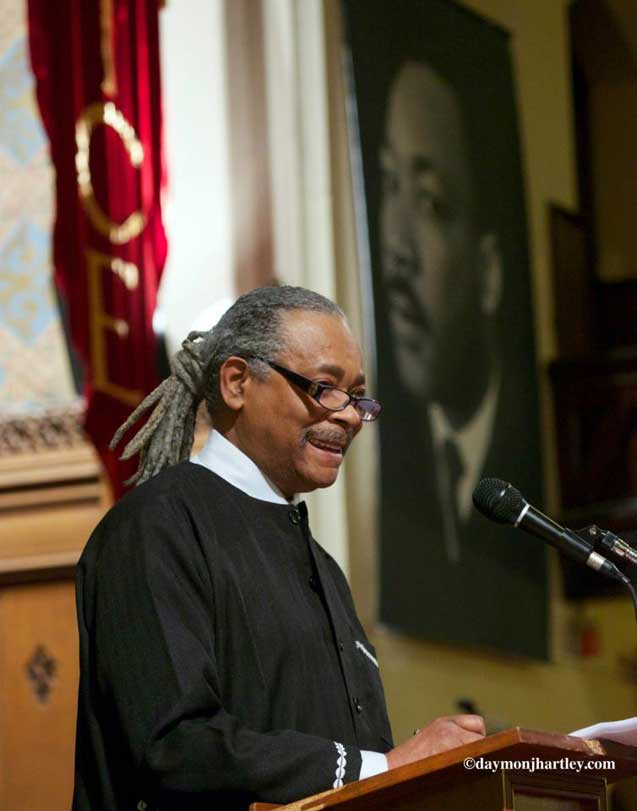 Professor Charles Simmons, founder and co-director of Hush House, addresses the crowd.
Professor Charles Simmons, founder and co-director of Hush House, addresses the crowd.
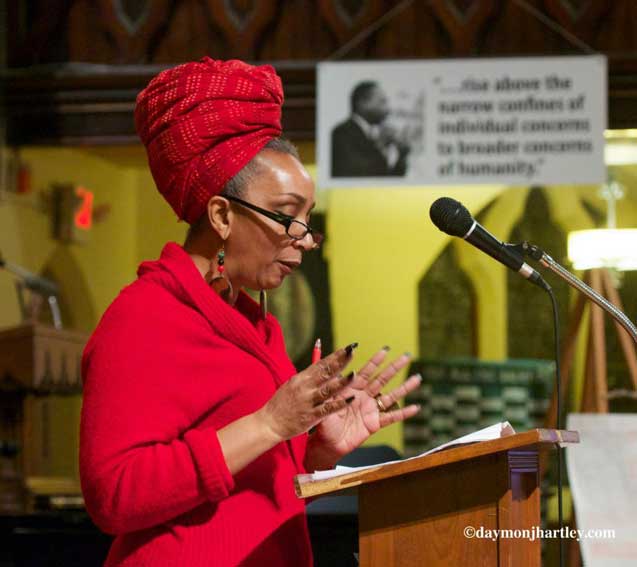 Reverend Sandra Simmons, co-director of Hush House, speaks.
Reverend Sandra Simmons, co-director of Hush House, speaks.
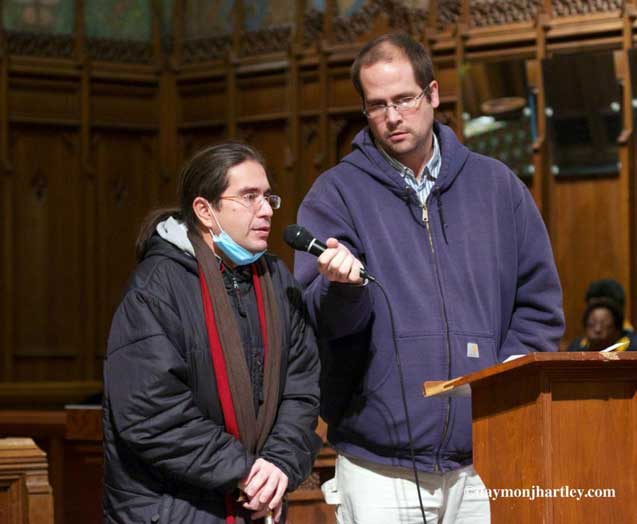 Jorge Parra, president of ASOTRECOL sewed his lips shut in a final hunger strike on Nov. 20th, asking GM to negotiate a dignified resolution for the 200 workers fired who developed workplace injuries.
Jorge Parra, president of ASOTRECOL sewed his lips shut in a final hunger strike on Nov. 20th, asking GM to negotiate a dignified resolution for the 200 workers fired who developed workplace injuries.
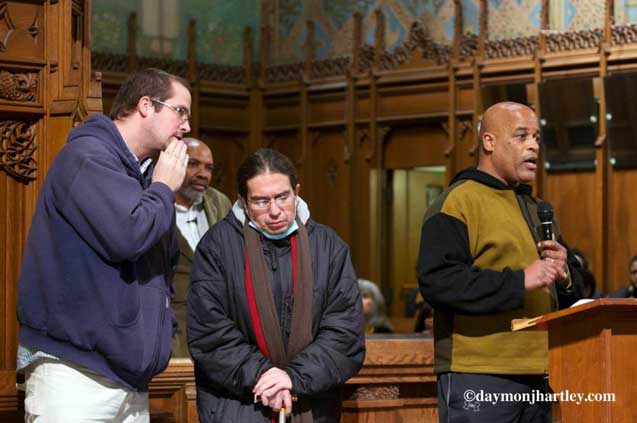 Melvin Thompson, Detroit autoworker and former President of UAW Local 140, connects the struggle for worker rights from Bogota, Colombia to Detroit, USA. In early December, Thompson began a fast in solidarity with Jorge Parra and the striking GM workers.
Melvin Thompson, Detroit autoworker and former President of UAW Local 140, connects the struggle for worker rights from Bogota, Colombia to Detroit, USA. In early December, Thompson began a fast in solidarity with Jorge Parra and the striking GM workers.
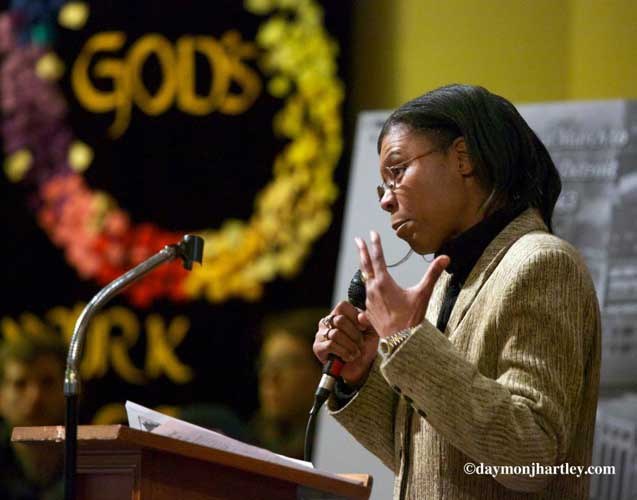 Vanessa Fluker (“The People’s Attorney”) stresses the need for courage as citizens fight against mass foreclosures, homelessness, and other consequences of predatory lending practices in vulnerable communities.
Vanessa Fluker (“The People’s Attorney”) stresses the need for courage as citizens fight against mass foreclosures, homelessness, and other consequences of predatory lending practices in vulnerable communities.
 Unidentified young girl, sitting in the front row, listens intently to the speeches.
Unidentified young girl, sitting in the front row, listens intently to the speeches.
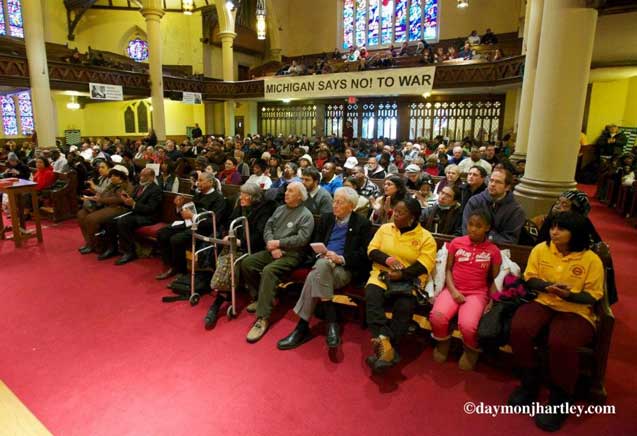 An overflow crowd attended the 10th. annual celebration of MLK. The event was first organized in 2004 as a response to the imperial advances in Iraq and Afghanistan, calling for the fortunes funneled to be re-directed into reconstructing decaying cities and instituting just social policies.
An overflow crowd attended the 10th. annual celebration of MLK. The event was first organized in 2004 as a response to the imperial advances in Iraq and Afghanistan, calling for the fortunes funneled to be re-directed into reconstructing decaying cities and instituting just social policies.
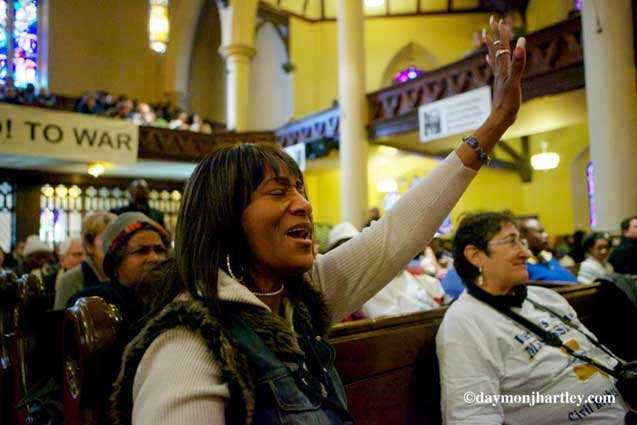 Unidentified member of the crowd shows her delight for the speeches.
Unidentified member of the crowd shows her delight for the speeches.
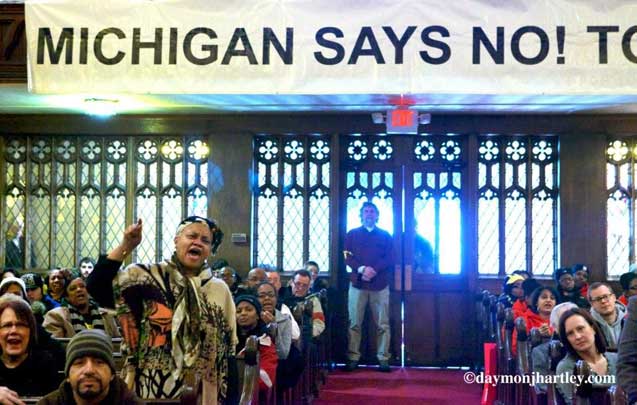 Longtime activist Maureen Taylor, state chair of Michigan Welfare Rights, reacts to a speech.
Longtime activist Maureen Taylor, state chair of Michigan Welfare Rights, reacts to a speech.
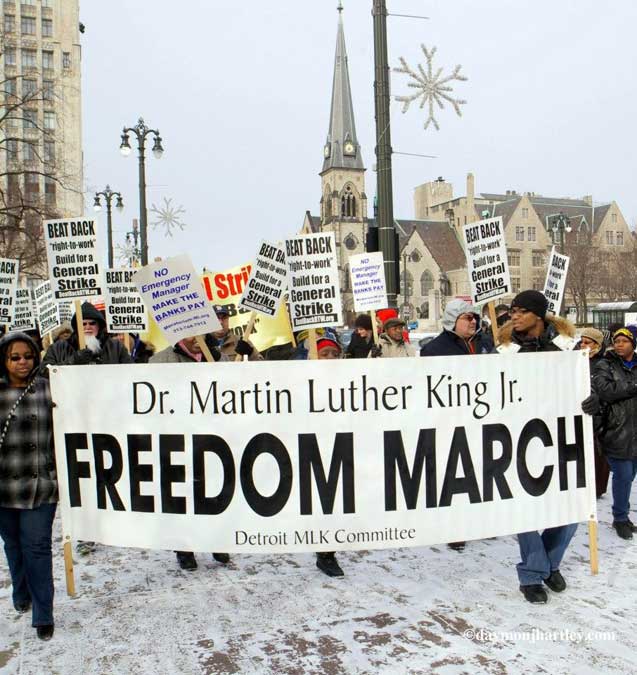 Several hundred folks begin a march to downtown Detroit in honor of MLK.
Several hundred folks begin a march to downtown Detroit in honor of MLK.
We’re not backing down in the face of Trump’s threats.
As Donald Trump is inaugurated a second time, independent media organizations are faced with urgent mandates: Tell the truth more loudly than ever before. Do that work even as our standard modes of distribution (such as social media platforms) are being manipulated and curtailed by forces of fascist repression and ruthless capitalism. Do that work even as journalism and journalists face targeted attacks, including from the government itself. And do that work in community, never forgetting that we’re not shouting into a faceless void – we’re reaching out to real people amid a life-threatening political climate.
Our task is formidable, and it requires us to ground ourselves in our principles, remind ourselves of our utility, dig in and commit.
As a dizzying number of corporate news organizations – either through need or greed – rush to implement new ways to further monetize their content, and others acquiesce to Trump’s wishes, now is a time for movement media-makers to double down on community-first models.
At Truthout, we are reaffirming our commitments on this front: We won’t run ads or have a paywall because we believe that everyone should have access to information, and that access should exist without barriers and free of distractions from craven corporate interests. We recognize the implications for democracy when information-seekers click a link only to find the article trapped behind a paywall or buried on a page with dozens of invasive ads. The laws of capitalism dictate an unending increase in monetization, and much of the media simply follows those laws. Truthout and many of our peers are dedicating ourselves to following other paths – a commitment which feels vital in a moment when corporations are evermore overtly embedded in government.
Over 80 percent of Truthout‘s funding comes from small individual donations from our community of readers, and the remaining 20 percent comes from a handful of social justice-oriented foundations. Over a third of our total budget is supported by recurring monthly donors, many of whom give because they want to help us keep Truthout barrier-free for everyone.
You can help by giving today. Whether you can make a small monthly donation or a larger gift, Truthout only works with your support.
